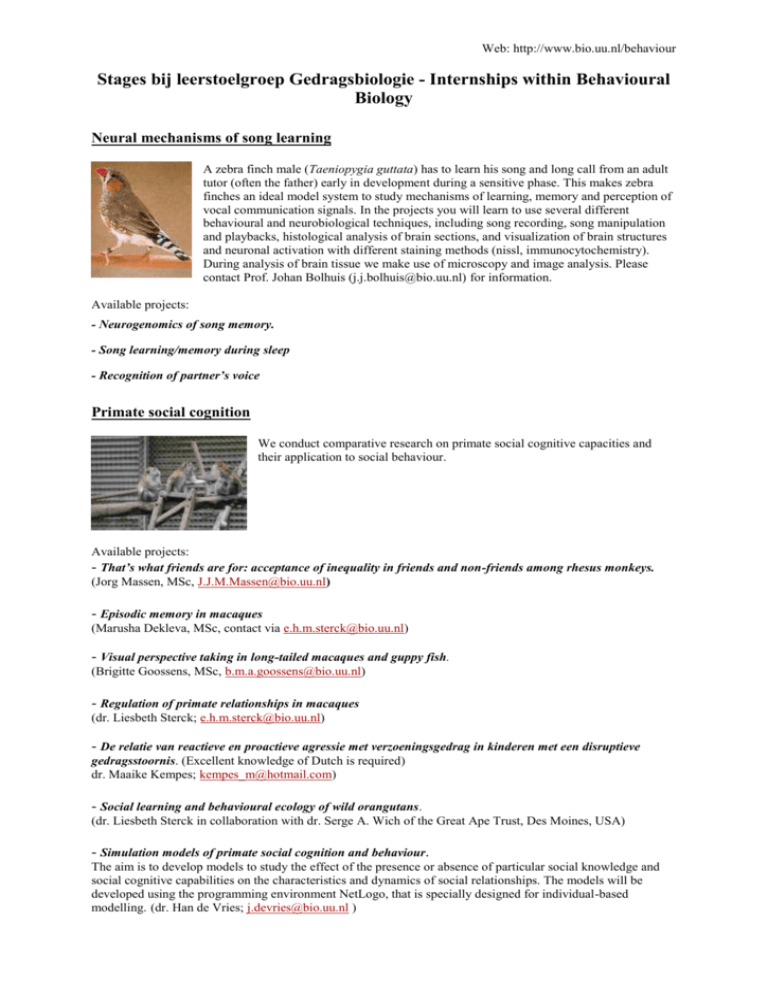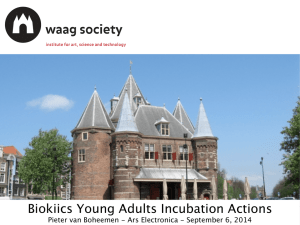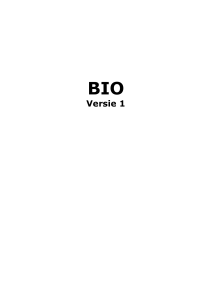Neural Mechanisms of Song learning
advertisement

Web: http://www.bio.uu.nl/behaviour Stages bij leerstoelgroep Gedragsbiologie - Internships within Behavioural Biology Neural mechanisms of song learning A zebra finch male (Taeniopygia guttata) has to learn his song and long call from an adult tutor (often the father) early in development during a sensitive phase. This makes zebra finches an ideal model system to study mechanisms of learning, memory and perception of vocal communication signals. In the projects you will learn to use several different behavioural and neurobiological techniques, including song recording, song manipulation and playbacks, histological analysis of brain sections, and visualization of brain structures and neuronal activation with different staining methods (nissl, immunocytochemistry). During analysis of brain tissue we make use of microscopy and image analysis. Please contact Prof. Johan Bolhuis (j.j.bolhuis@bio.uu.nl) for information. Available projects: - Neurogenomics of song memory. - Song learning/memory during sleep - Recognition of partner’s voice Primate social cognition We conduct comparative research on primate social cognitive capacities and their application to social behaviour. Available projects: - That’s what friends are for: acceptance of inequality in friends and non-friends among rhesus monkeys. (Jorg Massen, MSc, J.J.M.Massen@bio.uu.nl) - Episodic memory in macaques (Marusha Dekleva, MSc, contact via e.h.m.sterck@bio.uu.nl) - Visual perspective taking in long-tailed macaques and guppy fish. (Brigitte Goossens, MSc, b.m.a.goossens@bio.uu.nl) - Regulation of primate relationships in macaques (dr. Liesbeth Sterck; e.h.m.sterck@bio.uu.nl) - De relatie van reactieve en proactieve agressie met verzoeningsgedrag in kinderen met een disruptieve gedragsstoornis. (Excellent knowledge of Dutch is required) dr. Maaike Kempes; kempes_m@hotmail.com) - Social learning and behavioural ecology of wild orangutans. (dr. Liesbeth Sterck in collaboration with dr. Serge A. Wich of the Great Ape Trust, Des Moines, USA) - Simulation models of primate social cognition and behaviour. The aim is to develop models to study the effect of the presence or absence of particular social knowledge and social cognitive capabilities on the characteristics and dynamics of social relationships. The models will be developed using the programming environment NetLogo, that is specially designed for individual-based modelling. (dr. Han de Vries; j.devries@bio.uu.nl ) Web: http://www.bio.uu.nl/behaviour Social learning and innovation Many animals, such as guppies, have been shown to use social information from other group members in deciding where to feed, who to mate with, or what to eat. However, animals are often faced with conflicting information, and we are interested in how these conflicts are resolved. For example, an individual's personal experience may differ from the experience of other group members, meaning that individuals do not know which information is the most trustworthy. Alternatively, different group members may provide conflicting information from one another. How do individuals assess the reliability of a particular information source and choose between these information sources? How do innovations arise, and how do they spread through groups? We are also interested in the evolution of these capacities and the evolutionary consequences of social learning and innovation. Available projects: - Learning strategies in guppies and humans We are conducting experimental work with guppies (dr. Matt Bruce, m.j.bruce@bio.uu.nl) and address parallel questions in humans, in collaboration with Utrecht’s Human Innovation group (dr. Ulf Tölch, toelch@geo.uu.nl). - Neuropeptidal influences on social behaviour In zebrafish, we wish to investigate the influence of the peptides vasotocin and isotocin on social behaviour, focusing in particular on the social transmission of information between group members (dr. Simon Reader, s.m.reader@bio.uu.nl). - What are the causes and consequences of cognitive evolution? The large brains of primates are an evolutionary puzzle. They carry a number of costs, such as heavy energy demands or extended developmental periods. We examine the cognitive benefits of brain enlargement, and also the consequences of such enlargement for evolutionary rates (dr. Simon Reader, s.m.reader@bio.uu.nl). - What favours conformity and cultural transmission in humans? Cultural transmission is the foundation of human society. We learn from our parents, from teachers, and from each other. Moreover, we frequently conform to what the majority are doing. We are examining how the social environment, amongst other factors, influences reliance on cultural transmission. (dr. Simon Reader, s.m.reader@bio.uu.nl). Dierentuin in Antwerpen en Plackendael See also: http://webhost.ua.ac.be/crc/zjef.html Behavioural and evolutionary ecology of primates and social insects, and the ethology of zoo animals with a link to animal welfare. Research questions are related to all aspects of social organisation in animals, animal welfare, and integrated conservation. - Female mate choice and male reproductive success in bonobos in captivity. Our main interest is what determines a female’s choice for a mate, and why certain males are successful breeders while others are not. This involves behavioural observations in several zoos that keep bonobo groups, as well as studbook analyses. We are particularly interested in how personalities (with Alexander Weiss in Edinburgh) affect reproductive success, especially since male dominance rank does not seem to be involved in male reproductive success. Another objective is to study disassortative mating and MHC in bonobos (with Bill Jordan at the Zoological Society of London). (dr. Zjef Pereboom, zjef.pereboom@zooantwerpen.be) - paringsproblematiek bij monnikskapgieren Web: http://www.bio.uu.nl/behaviour Stages via leerstoelgroep Gedragsbiologie bij het NIOO: Populatie Biologie van Dieren (NIOO Heteren) Zie ook: http://www.nioo.nl/STUDENTS/subjectlist.htm - Oorzaken en gevolgen van dispersie bij de koolmees Verschillende stages zijn mogelijk die gericht zijn op het aantonen van verschillen in dispersie (aantal, afstand) van categoriën vogels die verschillen in eigenschappen of omstandigheden in hun oorspronkelijke leefgebied en de fitnessconsequenties daarvan in verschillende habitats en op verschillende momenten van de jaarcyclus (Piet Drent, p.drent@nioo.knaw.nl; Kees van Oers, k.vanoers@nioo.knaw.nl) - Genetica, ontogenie (gene-environment interaction) en functionaliteit (fitness) van copingstrategien/animal personalities bij de koolmees Verschillende stages zijn mogelijk die gericht zijn op gene-environment interactie, op relatie personality en agressif of sociaal gedrag en fysiologische kenmerken, op relatie personality en life history traits of op invlo9ed van variatie in de sociale en niet-sociale omgeving op co-exisitence van de verschillende populaties in ruimte en tijd. (dr. Piet Drent, p.drent@nioo.knaw.nl; dr. Kees van oers, k.vanoers@nioo.knaw.nl) Plant-Animal Interactions (NIOO Nieuwersluis, Maarssen) See also: http://www.nioo.nl/STUDENTS/subjectlist.htm - Herbivore foraging theory Verschillende stages zijn mogelijk die gericht zijn op foerageertheorien zoals ‘optimal patch use of Bewicks’s swans’, ‘change of foraging habits under interference’, ‘how to forage in a flock’, ‘functional response and patch choice of grass-feeding Bewick’s swans (zie voor contactadressen: http://www.nioo.knaw.nl/CL/PDI/CONTEN T/student.htm) - Bird migration and plant dispersal Verschillende stages zijn mogelijk zoals ‘climate change: are migration costs reduced for arctic breeding geese? Modelling energy expenditure during flight and staging’, ‘Goose migration: how much do they gain when staging on different habitats? Meta-analysis of gain functions on goose stop-over sites’, ‘Goose migration: impacts of climate and land use changes on migration schedules of Barnacle geese’, ‘Bird as seed dispersers: gut transition time during flight’. (zie voor contactadressen: http://www.nioo.knaw.nl/CL/PDI/CONTENT/student.htm)

